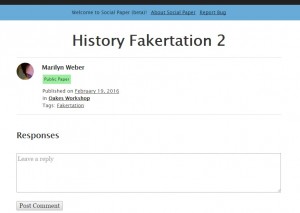The CUNY Academic Commons is proud to announce a writing tool conceived of by CUNY graduate students for CUNY graduate students. Social Paper was conceived of by two GC students, Jennifer Stoops and Erin Glass. Housed within the CUNY Academic Commons, it enjoys all the features and protections available to Commons groups. Groups can be started with any Commons members, no matter what their role within CUNY. It provides an easy way to share academic work publicly, or in a private and protected setting – the choice is yours.
It is a universally acknowledged truth that writing your dissertation can be a lonely and isolating process. Humanities doctoral programs have long tried to counter that silo feeling by offering Dissertation Workshops, where students are encouraged to share their work with other dissertators and a seasoned faculty member. Unfortunately, this approach has not always translated to a dynamic lived experience in the classroom. While the bad old days of hand-written suggestions are mercifully gone, sharing work by email is only marginally better. Tracking changes within Word documents or using Google Docs is a step in the right direction, but even those platforms don’t allow for as much back-and-forth as is truly helpful. Social Paper is here to help!
The PhD Program in History will be trying out Social Paper in its Spring Dissertation Workshop with Professor James Oakes. As the admin for the History Dissertation Seminar, I’ll periodically update this blog to let you know about our triumphs and challenges.
The Workshop participants have learned how to create a Social Paper via this Codex entry. Dissertators are very worried about sharing their embryonic work, and so they have also read this tutorial – to ensure that their papers are only available to members of selected groups (in the case, the Oakes Workshop) on the Commons. The how to leave comments guide can be found here.
Using Social Paper in the classroom is a specialized experience. In addition to the guides above, the following features have already proven useful in the classroom experience:
NOTE 1:
Authors are encouraged to use the general comment section at the bottom of the paper (visible upon Publication) to provide overall instructions – e.g., “This is a first draft, be merciful!” of “The section on Cupcakes has already been accepted by the Journal of Historical Sweetums.”

NOTE 2:
The dissertations are being shared within a Commons Group, the Oakes Workshop. The other features within the Group – Forums, Announcements and Events Calendar – may be used for discussion and planning outside the confines of individual papers.
NOTE 3:
The Social Paper is useful not only at the level of the individual project – in this case the dissertation draft that is being circulated and commented on in the workshop. It is the hope of the developers that students can use the exchange of ideas generated within comments to provide a jumping off point for new ideas. One fairly common criticism of dissertation drafts is that the author in fact has too many ideas, and should perhaps hold some of them back – perhaps for the second, tenure-clinching book. Off-hand comments that aren’t germane to original project can now be stored within the draft, complete with a record of just who gave the inspiration for that next book. (A helpful tool when writing your acknowledgements page!)
Of course, comments on their own work will be the focus of each student for this class, but Social Paper will also make it easy for students to find the comments they left on the work of others as well. We have all had the annoying experience of only vaguely remembering an inspiration sparked by another’s comment, and sometimes “walking back through the room” by re-reading the original text helps. But by keeping the comments stored in SP, the authors can literally see their marginalia (from all papers they left comments for).
NOTE 4:
Because SP was created within CUNY, as opposed to a commercial developer, the student author can feel more confident that the papers and comments are as private or as public as they wish it to be. As students graduate and move into other roles, their Commons archive will remain accessible.
We’ve covered a lot of ground today, class. Further posts will be forthcoming, but don’t forget that my virtual office hours are 24/7 in room support@cunycommons.zendesk.com . Class dismissed!



[…] and Jennifer Stoops (Urban Education). Marilyn Weber recently wrote a post on this blog about “Social Paper in the Classroom,” it comes highly recommended as a more detailed overview, but let me pull here from the source, […]